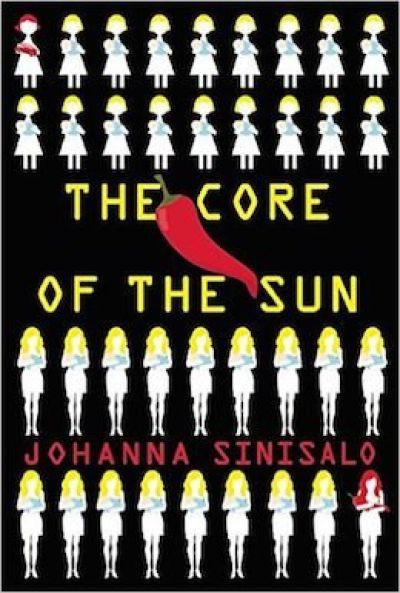A Long Cold Lonely Winter
The Core of the Sun
By Johanna Sinisalo

11 Apr, 2017
The 2017 Prometheus Award Finalists
0 comments
2013’s The Core of the Sun is a standalone dystopian novel by Johanna Sinisalo. First published in Finnish, the 2016 English edition was translated by Lola Rogers. It’s also the first of four reviews of 2017 Prometheus Nominees (I sure hope I have written the intro for the series of reviews by the time this review is posted).
The Eustitocratic Republic Finland is a utopia … or so it assures its citizens. If you cannot trust an intrusive, nanny-state that goes to extraordinary lengths to isolate its people from the outside world, whom can you trust? The people of Finland live healthy, properly ordered lives, unlike the legions of unfortunates trapped in hedonistic, decadent democracies.
The key to this dazzling success is the proper domestication of women.
Consent sounds like a good idea, but it has its drawbacks. Allowing women to decline proposals merely because the men are unappealing leads to sexually frustrated men. Sexually frustrated men are violent and criminally inclined. The obvious solution is to simply remove the burden of choice from women.
Finland took this daring program one step farther by deliberately breeding women to be compliant. Girls are tested from a young age to see if they are proper, submissive stock or if they are unacceptably independent. The first category — eloi — are given lessons in wifely comportment before being made available to would-be husbands. The second category — morlocks — are sterilized and consigned to life as labourers.
Vanna looks like an eloi. But behind that charming, seemingly harmless facade lurks the mind of a cunning morlock. A morlock who (gasp!) engages in criminal activity. With the help of her lover Jare, Vanna is up to her eyeballs in the illicit capsaicin trade, providing the helpless pepper addicts of Finland with the spicy temptation from which their government tries so hard to protect them.
The Health Authority is ever vigilant. Given time, they will notice Vanna and Jare’s little venture. Arrest and detention are inevitable, unless Vanna and Jare can flee with their blood money to some decadent hedonocracy. Alas for Vanna, she is tied to Finland by a mystery she is determined to solve: what really happened to her missing eloi sister Manna?
~oOo~
It is hard to guess if Vera’s mystical experience at the end of the novel actually happened or if she is just hallucinating. Unfortunately, what she discovers in the course of it is all too plausible.
I recommend not duplicating some of Vanna’s cunning methods of testing and hiding hot peppers. I suspect they would not work out so well in life as they do in fiction.
There are few aspects of women’s lives the Republic does not regulate and that includes names. Vanna was originally named Vera. Manna was named Mira. When circumstances forced them to move to Finland as girls, the government forced new names on them that conform to Finnish protocol. That may seem heavy-handed, but of course naming laws are not exactly uncommon.
In fact, there’s very little in this novel that does not have real-world parallels, either implemented in real life or strongly advocated by obsessive rec.arts.sf.written regulars. You’d think it would be surprising if anyone (male or female or whatever) were to think that most of life’s little challenges would evaporate if only women’s lives were worse. Alas, it is not. There are only too many people who hold just such opinions — and flaunt them online. Or enact them in the real world. That’s what inspired this book, dammit.
The quest for the ultimate pepper of mystical prowess does seem a bit unlikely but as the author explains, she had a real-world inspiration there as well: the tongue-in-cheek Transcendental Capsaicinophilic Society, whose website can be found here. The TCS may be a joke, but one should never underestimate the potential for an off-handed party joke to become an actual religion [1].
I can see why this appealed to the Libertarian Futurist Society. Cannot go wrong pitching to libertarians a tale about a dreadful nanny-state that over-regulates food. See, for example, F. Paul Wilson’s classic libertarian tale, “Lipidleggin’”, in which citizens are denied tasty, fatty goodness. Of course, obsessive control of diet is only a minor component of the Health Authorities’ efforts to crush choice. In fact, the pepper trade exists because banning peppers is such a minor concern. It’s far more important to control women: not only with laws and custom, but with a eugenics program aimed at making it impossible for women to even think about stepping out of line.
It’s not clear how the Health Authority plans to prevent the eugenics program from affecting males as well as females. After all, most baby boys are very closely related to their biological mothers. The first possibility is that the government, having isolated itself from naysayers, has a prodigious ability to delude itself. Or it may be that despite cant about proper, innate male characteristics, the Health Authority would not mind overmuch if the men werealso bred for compliance.
Vera is an engaging protagonist. The novel in which she appears should appeal to libertarian and non-libertarian readers alike. That the Libertarian Futurist Society selected this as one of their five finalist novels is an interesting glimpse of the LFS’ 2017 mindset.
The Core of the Sun is available here (Amazon) and here (Chapters-Indigo).
1: I’ll probably regret adding a link to that last phrase so I will clam up. Feel free to speculate as to which litigious religion I am referencing.
Feel free to comment here.
